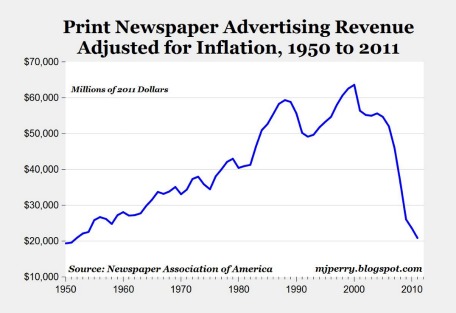The newspaper paywall now has a champion in some guy in Nebraska named Warren Buffett.
Buffett, who just forked over $150 million for the Omaha World-Herald Company, has some wise words, however late, on newspaper business models: Stop giving away your product with one hand while charging good money for it with the other.
Buffett tells CNBC’s Becky Quick that papers have three major problems, two of which they can’t really fix:
But the third thing is that newspapers have been giving away their product at the same time they’re selling it. And that is not a great business model. So when they put papers up on the Internet and you get it free, you’re competing with yourself. And that— you’re seeing throughout the industry— you’re seeing a reaction to that problem and an answer to it, and that’s important for the…
BECKY: And the answer is charging people online?
BUFFETT: Yeah.
BECKY: Yeah.
BUFFETT: Yeah, in other words, you shouldn’t— you shouldn’t be giving away a product that you’re trying to sell.
This is what Walter E. Hussman Jr., who owns the Arkansas Democrat-Gazette, has been saying for years now. His paper has charged online, and its daily circulation has fallen just 3.5 percent in the past decade while U.S. papers overall tumbled 16 percent from 2002 to 2009 alone (when Newspaper Association of America numbers stop).
The Wall Street Journal has charged from the beginning and its print circulation has stayed roughly even over the past ten years, while overall circulation, including digital subscriptions has actually risen significantly. The New York Times has already reaped tens of millions of dollars a year in incremental revenue by adding its paywall, and now it seems everybody is jumping on board, including Gannett and the Los Angeles Times.
Jeff Bercovici notes that Buffett’s prescription for newspapers isn’t being used at the Washington Post, where he owns more stock than any other shareholder and sits on the board. I would note, though, that the Buffalo News, which Buffett controls, said this week that it’s considering one. And while Buffett is famous for letting his managers run their businesses, you can bet that paper will have one.
GigaOm’s Mathew Ingram says Buffett doesn’t understand the industry, writing that the news business is not actually in the news business:
I’m going to side with the Washington Post on this one, and one of the reasons for that is the way that Buffett describes his argument: he says that newspapers are giving away their product while still trying to charge for it. But that assumes the “product” is the news, and that this is what newspapers are charging for — and I don’t think that’s really the case any more. For content companies of all kinds, the product is (and in many ways, always has been) the relationship that you can build with readers around your content. And the monetization of that now comes in many different forms.
With the anti-paywall folks, paying for news is never actually paying for news. You see, when you pick up The New York Times or Bloomberg BusinessWeek at the newsstand, you are not paying for the news—the stuff you thought you were paying for. You’re paying for the relationship.
I don’t think so.
Anyway, relationships, which every industry has, aren’t quite what they used to be in the news industry, of course. Circulation is one thing, and advertising revenues are another. When last I checked, newspaper industry ad revenues were at 1963 levels in real terms. As Michael Perry writes today, they’re now the lowest they’ve been since 1951 and down two-thirds in eleven years:
Paywalls aren’t going to fix that problem. But guess what? Nothing is going to fill that $40 billion hole. Readers, if they want professional content, and I think they do, are going to have to foot more of the bill.
Buffett, one of the great investors of all times, gets it.
Ryan Chittum is a former Wall Street Journal reporter, and deputy editor of The Audit, CJR’s business section. If you see notable business journalism, give him a heads-up at rc2538@columbia.edu. Follow him on Twitter at @ryanchittum.

